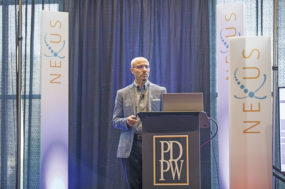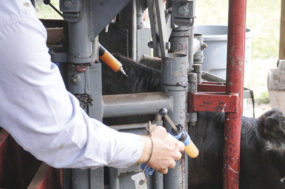Once upon a time there was a Grasshopper. He loved to dance and sing. All day in the summer he danced and sang to his heart’s content. He watched the ants carrying bits of grain and corn into their tunnels. He laughed at their labors.
One ant warned him of his folly: “We are storing food for the winter, and you would be wise to follow our example.”
The Grasshopper chirped and danced away. “The world is green and lovely! Winter will never come!” he said.
The ants shook their heads and continued their vigilant march underground, carrying away their stockpiles.
The skies grew gray, and the winds began to howl. Then snow swirled around, and the ants were snug in their deep hole with plenty to eat.
The Grasshopper shivered in the cold outside wishing that the ants would give him a bit of food, but the ants could not hear his knocking. He was alone in his misery.
Aesop, a Greek slave who earned his freedom with his insightful stories of wit and wisdom, has impacted people for eons. Today the story about the ants and the Grasshopper is just as relevant as it was centuries ago.
Although Americans live in a land of plenty, we do not gather food and store it up for the winter. We live from day to day, shopping at supermarkets that are filled to overflowing with food, clothes and other products marketed as necessities. Winter or summer the store is always open. Many people have lost sight of the seasons altogether, except for the inconvenience of icy winter roads and summer’s heat, which is bothersome only from the car to an air-conditioned building. Life has become so automated that children hear Aesop’s story about the ants and Grasshopper and ask, “Well, why doesn’t he just go to the store when he is hungry?”
Several years ago, my parents attended a meeting for cattlemen where some environmental activists were railing on open-range laws. These dissidents were suggesting that the cattle be moved from the range completely. One cattleman, frustrated with the situation, asked the environmentalist if he ate meat.
“Why sure, I eat my steak like the rest of you,” answered the activist leader, obviously proud that he was doing his part.
The cattleman squared of with him and said, “Where are you going to get your steak if you get rid of all the cattle?”
The activist’s response dumfounded everyone: “I will buy it at the store.”
We should not be too judgemental about this man’s comment. After all, we live in a supermarket smorgasbord society. How was he to know that the meat he buys in the store comes from the same cattle that are raised on open ranges or feed lots?
Children in schools are puzzled and even sickened when they are told where eggs come from, and they are even more troubled when they realize that milk comes from cows and not the carton factory. When they do get the information correct, they think that chocolate milk comes from brown cows, white milk comes from white cows and strawberry milk comes from red cows.
We no longer live in an agricultural society. We live in the information age, and some of the information we get is not worth the paper it’s printed on or the electrons that sent it.
No wonder the ant and the Grasshopper story is an enigma to many children. Some children wonder why don’t the ants share with the Grasshopper. They say, “Poor thing shivering out there in the cold with no food!” Not being familiar with the diet of grasshoppers and ants, they can’t understand that it would be impossible for the ants to share with the grasshopper.
It reminds me of the Parable of the Ten Virgins. The foolish virgins didn’t take enough oil for their lamps. Then they clamored to borrow from the five wise virgins. Of course, the wise virgins would not share. They seemed selfish on the surface, but if they had given away their oil, everyone would have been in the dark, and no one would have been there to meet the bridegroom. Sharing is not always possible or right.
Personal preparation is the key! Americans have always been fiercely independent. Back in 1776, we proclaimed to the world that we are independent of all foreign powers. With the Civil War and the emancipation proclamation, we declared that America would have no more slaves. We would stand by the founding father’s adage, “All men are created equal.”
Despite all the proclamations and declarations, I’ll wager that we have more slaves in America than we had before the Civil War. Look at the millions of Americans who have the trappings of prosperity, yet they walk daily with the ball and chain of debt dragging from their ankle. They live one step away from financial ruin. It would only take about three months to lose everything they have.
Banks hold a first and second mortgage on their home. They owe for the car in their three-car garage. They owe for the plasma TV, and the CDs in the cabinet are financed by a low monthly payment through a club subscription. They owe for their washer and dryer and their new fridge. Their new carpet, tile and furniture are a great deal; they won’t have to pay anything on them for a year. And there won’t be any interest unless D-Day happens. In that case, the kind, generous company will attach all the back interest at a whopping 24 percent. Bondage? Slavery?
Americans owe for their weight training equipment and will still have to pay for it even if the equipment has only been used once after it was taken from the box. They owe for last year’s vacation and Christmas. They owe on Credit Card A for their new clothes and jewelry. They owe on Credit Card B for the hunting trip. They owe on Credit Card C for their credit consolidation. They owe their brother-in-law for the business they always intended to build but never got around to it. They owe for insurance and land taxes. They are walking the treadmill just fine until gas prices go up and a medical emergency occurs and then down comes their house and its foundation of sand. Oh, foolish men!
That’s okay, because even after bankruptcy in our society, we can still get a loan to start all over again. Someone will take care of us. After all, we will be cold and hungry. Someone will take pity on us. Uncle Sam will gather up the pieces of our shattered life, and we will move on. What happens if Uncle Sam has to tighten the belt? What happens if the supermarkets close their doors for the winter? Some say, “That can’t happen in the U.S.!” But ask those who lived through the Great Depression. There are still a few of them around.
The story of Joseph who was sold into Egypt applies here. Pharaoh had a dream of seven years of plenty followed by seven years of famine. Joseph interpreted the dream and started to prepare. Because Joseph was wise, he was able to save thousands of people, including his family, from starvation. Maybe we are living in a cycle of seven years of plenty. Maybe it is time to prepare for the lean years.
I am not Chicken Little on a soapbox screaming, “The sky is falling!” But wisdom tells me that Aesop’s fable is still relevant today. Financial preparedness it a great idea! Get out of debt! Save a little for a rainy day! Get off the buying treadmill and learn to get along with what you have. After all, it is not what you have that makes you happy, it’s what you appreciate. PD




